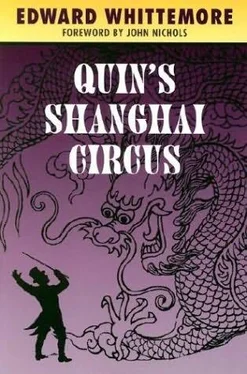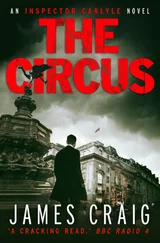Edward Whittemore - Quin’s Shanghai Circus
Здесь есть возможность читать онлайн «Edward Whittemore - Quin’s Shanghai Circus» весь текст электронной книги совершенно бесплатно (целиком полную версию без сокращений). В некоторых случаях можно слушать аудио, скачать через торрент в формате fb2 и присутствует краткое содержание. Жанр: Фэнтези, на английском языке. Описание произведения, (предисловие) а так же отзывы посетителей доступны на портале библиотеки ЛибКат.
- Название:Quin’s Shanghai Circus
- Автор:
- Жанр:
- Год:неизвестен
- ISBN:нет данных
- Рейтинг книги:3 / 5. Голосов: 1
-
Избранное:Добавить в избранное
- Отзывы:
-
Ваша оценка:
- 60
- 1
- 2
- 3
- 4
- 5
Quin’s Shanghai Circus: краткое содержание, описание и аннотация
Предлагаем к чтению аннотацию, описание, краткое содержание или предисловие (зависит от того, что написал сам автор книги «Quin’s Shanghai Circus»). Если вы не нашли необходимую информацию о книге — напишите в комментариях, мы постараемся отыскать её.
Quin’s Shanghai Circus — читать онлайн бесплатно полную книгу (весь текст) целиком
Ниже представлен текст книги, разбитый по страницам. Система сохранения места последней прочитанной страницы, позволяет с удобством читать онлайн бесплатно книгу «Quin’s Shanghai Circus», без необходимости каждый раз заново искать на чём Вы остановились. Поставьте закладку, и сможете в любой момент перейти на страницу, на которой закончили чтение.
Интервал:
Закладка:
The train lets him off at a fishing village. He limps down to the beach, ignoring the astonished stares of the villagers, and sits down on the sand. A wind has begun to blow, but no matter. First he takes off the black bowler hat he has worn for nearly thirty years, ever since that morning he picked it up in a deserted warehouse on the outskirts of Shanghai and went away to hide and eat horseradish, the first of many times he would eat horseradish to try to quell the stink of his own soul, a stench that had first overpowered him that morning when he went to the warehouse to help his sister, to help the man who had been a boyhood friend, and discovered he was too late.
Too late. The night before the circus his projector had broken down. Two frames had stuck together in the lens and hypnotized him, put him to sleep. And so the next day he began eating horseradish, he put the black bowler hat on his head and never took it off in order to remember always the hatred he felt for his own black soul.
Now he removes that black hat and in its place he ties a large one made of straw, so low it covers his face, a hat worn in the Orient only by men condemned to death and by mendicant monks, those two alone, for it is traditional wisdom in the Orient not to look upon the face of a man about to die or the face of a man who begs in the name of Buddha.
The straw hat is affixed, the greatcoat is wrapped around him. He takes the mantle of Elijah and opens the first bottle of gin, pours, fills the hypodermic, recaps it. As he has seen others do, he ties a cord around the upper part of his arm. He touches a bulging vein. He plunges the needle into the vein and pushes the gin into his bloodstream.
A scream. Is this the still, small voice Elijah heard in the desert?
The needle falls from his hand and he’s a long time in finding it. Slowly he cleans the needle on the red flannel wrapped around his neck, cumbersome work because he can’t see what he’s doing, because he’s already incapable of untying the string around the flannel and holding the flannel in front of him.
Finally the needle is free from sand or more or less free from sand. Once more he pours gin, fills the needle, stabs his vein.
Shoots gin.
Shooting up a valise of gin.
Night comes. He has finished one bottle and started on another. The wind lashes him, the waves whirl high in the air. By morning he has emptied all the bottles and the sea has carried them away, carried away the valise and the needle as well, for now the typhoon is blowing full force.
A man sits on the sand in the eye of chaos and he neither sees nor hears. His legs are crossed, his chin rests on his chest, he is oblivious to all that passes in the world. Even if the princes and despots of a thousand lawless regions were to attack him it would be useless. Nor could the entire assembly of man attract his attention with their pleas, their dreams, their follies. He is invulnerable to everyone and everything, beyond sensation, alone at the end of the earth, alone on the far side of the moon, the dark side, with only the void as companion and parent and child.
The typhoon blows three days and three nights. As it subsides our man awakes at the bottom of the sea, on the floor of the ocean, where the typhoon has draped him with seaweed. Seaweed hangs from his straw hat, encrusts his arms, embraces his shoulders and his belly. The entire lower half of his body is hidden beneath the slippery fingers of rich iodine matter.
His legs are numb and his bad shoulder aches. He is cold, wet, devastated, totally ravaged. His mind is dazed and his eyes are two slim, slanting pools of nothingness. It is as if he were thinking thoughts too profound to be uttered.
On the ocean floor our man sees in front of him a line of gnarled, sturdy ancients, village elders, men who have known a life at sea. Their faces are the bows of ships, their hands are fish hooks. It is a scarred and weathered delegation, an embassy from some distant land above the sea. He watches them fall to their knees and press their foreheads to the sand.
The sands around him are stained with excrement and vomit and urine. A smell of putrid flesh hangs in the air, a stink of decay given off by layers of rotting clothing soaked under seaweed. Yet this foreign embassy seems unaware of the foul odors rising from the foul sands. They are bewitched by the immense, immobile figure dressed in seaweed.
He sees them gaze in awe at his straw hat and he realizes they have mistaken it. To them it is not the sign of the condemned man, it is the mark of the monk who traces the merciful steps and begs in the name of Buddha. Yes, obviously they have mistaken it.
Or is it he who has mistaken it?
For it seems that during the last three days and nights much of the Japanese coast has been destroyed. Above and below the village fishing fleets are wrecked, houses washed away, friends and relatives drowned. This village alone among hundreds has been spared. And how can that be unless the stranger who arrived mysteriously at the onset of the storm and took up his place by the sea, remaining there for three days and nights oblivious to wind and rain and waves, unless the stranger is a reincarnation of Nichiren, that militant holy man of the thirteenth century?
The village elders press their heads to the sand. They offer prayers to their patron saint and beg him to have mercy on them always, to protect them and stay with them forever, to honor them by living on the food they will provide in the temple they will provide.
Our man shakes loose the seaweed that encumbers him and rises to the surface of the water. He looks at the sun. He looks at the house in the pine grove on the cliff above the sea. He removes the straw hat that covers his face and recalls the words learned long ago in a No play, the words taught to him by a thin erect No actor of incomparable skill and subtlety, magnificat anima mea Dominum , my soul doth magnify the Lord.
Thus he bows and accepts the vocation that has come to him at last. Gravely he raises his head and greets the embassy of that small empire you see across the bay.
It was dark on the terrace. Geraty lit a candle and placed it between them in a glass chimney. His massive, solemn face hung over the railing searching for something below, a seagull or a rock or a wave.
The candle flickered. Briefly Geraty raised his hand to preach to the invisible seagulls, the invisible rocks, the invisible waves.
When do you leave?
Tomorrow. My ship sails from Yokohama.
Quite so.
Do you ever think of any of them anymore? Of America?
No. Never. There is no America here inside me, no Tokyo and no Shanghai either.
Geraty loomed up in front of Quin. His presence swelled until he filled the shadows of the terrace, his breathing noisier than the waves on the sides of the cliff. He was frowning. His white hair swirled over his face.
It may be, nephew, that you don’t quite understand it yet. It’s true that a monk ruled in the thirteenth century, a monk and not the Emperor or the great General or even the reckless circus master with his desperate, clever acts. Of course I’m not sure who you are, we can never be sure with another, but that doesn’t matter. The fishermen of this village believe I have the powers of Nichiren. They might even believe I’m a reincarnation of his strange spirit. But how could that be? Is that really the way it is?
Geraty stared hard at Quin. Far back in those huge eyes Quin saw a smile begin, and precisely at that moment the candle flame came to rest. The light was somber, still. The wind had stopped.
Not enough, whispered Geraty. Not just his powers and his will. What they perhaps don’t know is what you perhaps don’t know. It’s the final truth of the final scene, and it may be that no one knows it except me. Yet it’s simple enough, simpler than anyone would suspect.
Читать дальшеИнтервал:
Закладка:
Похожие книги на «Quin’s Shanghai Circus»
Представляем Вашему вниманию похожие книги на «Quin’s Shanghai Circus» списком для выбора. Мы отобрали схожую по названию и смыслу литературу в надежде предоставить читателям больше вариантов отыскать новые, интересные, ещё непрочитанные произведения.
Обсуждение, отзывы о книге «Quin’s Shanghai Circus» и просто собственные мнения читателей. Оставьте ваши комментарии, напишите, что Вы думаете о произведении, его смысле или главных героях. Укажите что конкретно понравилось, а что нет, и почему Вы так считаете.












